Today is the 100th birth anniversary of one of my favourite Hindi film actors, the extremely talented, very versatile Balraj Sahni. Born on May 1, 1913 (an interesting coincidence, considering he went on to become the first president of the leftist All India Youth Federation), Balraj Sahni became a prominent writer—first in English, later in Punjabi—and, of course, a brilliant, much-respected actor, with a dignity and screen presence that made him stand apart in films as different as Do Bigha Zameen, Waqt, Kabuliwaala, Haqeeqat, Anuradha, and Sone ki Chidiya.
On the occasion of Mr Sahni’s birth centenary, I wanted to review a film of his. Unfortunately, going through his filmography, I realized that I’d actually reviewed almost all my favourite Balraj Sahni films already. Whether it was the oppressed, yet unfailingly gentle Shambhu of Do Bigha Zameen, or the kind yet oblivious Dr Nirmal Choudhary of Anuradha. Or the poet Shrikant, who brings back from the brink the shattered orphan, Lakshmi, in Sone ki Chidiya. Or the eponymous Kabuliwaala, seeing in little Minnie his own daughter Ameena… I’d already praised them all. And some more.
This, therefore. A relatively little-known Balraj Sahni film, but an enjoyable one nevertheless, and with some surprises in the casting.
The setting of the first scene is the village of Anandpur, where the blind Chandan (Balraj Sahni) lives all by himself, weaving baskets for a living. Chandan is an orphan and has no living relatives, but is by no means alone in the world. Kaka (‘uncle’; Nasir Hussain, as avuncular an uncle as anyone could hope for) is an old, one-legged soldier who regards Chandan as his own son.
Or son-in-law, since Kaka’s daughter Basanti (Shyama, as spunky a Basanti as a later and more famous Basanti) is in love with Chandan—and he with her. Chandan and Basanti have been childhood sweethearts, and are now saving up to get married. Both Kaka as well as Basanti’s younger sister Radha (?) are as excited about the match as the happy couple themselves.
To this village come two city slickers, Parker (Johnny Walker) and his assistant, Bhagwan (?). Parker and Bhagwan are selling lottery tickets—just Rs 7.50 per ticket, and the chance to win huge sums of money. Who will buy a ticket?
Nobody will, sadly. The villagers are not exactly rolling in wealth, and gambling such a large amount is beyond their means. Parker, disheartened, gives up and is on his way out when he stops at Chandan’s home to ask for a glass of water.
In the polite conversation that ensues, Parker reveals his business in Anandpur, and Chandan offers to buy a lottery ticket. Parker is taken aback, but recovers swiftly enough to urge Chandan on.
Chandan goes into his room to fetch the money, and Basanti—who was passing by, and has realized what’s happening—comes in, too. Smart girl that she is, she tries to dissuade Chandan. Rs 7.50 isn’t a small sum (it is, in fact, the total of Chandan’s savings).
But Chandan is adamant. Parker has come all the way from the city; what will he think of the villagers if not a single one of them buys a ticket?
So Chandan empties out his gullak, hands over the money to Parker, and doesn’t really bother about the ticket which he receives in return. It’s a foregone conclusion, not just for Chandan, but for everybody around, that poor blind Chandan isn’t going to be winning any lottery.
The scene now shifts to Bombay, where Parker and Bhagwan have returned. Parker goes to meet his girlfriend Leela (Minoo Mumtaz) at the hotel where she’s a dancer. We discover, in the course of the evening, that:
(a) Leela hasn’t been paid in months
(b) Parker isn’t welcome here, because he has run up huge unpaid bills in food and drink
(c) As a result of (b), Parker is at daggers drawn with the owner/manager of the hotel…
…which causes Parker to, in a fit of anger, tell Leela to quit her job. She can come over and stay at his place.
Leela, who seems to have as little foresight as her beau, immediately chucks up her job, packs her suitcase, and goes home with Parker—only for them to discover that the many men (all of them rather belligerent) to whom Parker owes money have decided to camp out at Parker’s shabby little kholi, waiting for him to show up.
To cut a long story short: Parker and Leela are in serious need of money and not [this is important, since it goes towards establishing their standing in the story] because of circumstances beyond their control, sheer bad luck, or worthless relatives. It’s all mostly their own doing—Parker’s perhaps more than Leela’s.
Shortly after, however, it appears that Parker’s guardian angel has suddenly woken up. Chandan’s ticket has won the lottery, of Rs 4.5 lakhs!
Parker and Bhagwan are very excited, and scurry off to meet their boss, Mr Khanna. Parker starts pestering Mr Khanna about the commission due to him, Parker, but Mr Khanna dampens his spirits by telling Parker the rules: the winner of the lottery must come to the office to collect the prize money, and the commission will only be given once that is done.
So Parker and Bhagwan go to fetch Chandan. They bring a noisy band, in a large van, and create quite an uproar. Everybody’s excited, some [especially Basanti and her little sister] already dreaming of how Chandan will put the money to use.
Chandan takes a while to get used to the idea that he’s now a lakhpati, but Parker finally manages to galvanize him into getting ready to go to Bombay to claim the money.
This is where an unforeseen obstacle rears its head [as far as Parker’s plans are concerned]. Kaka, ever-protective of Chandan, refuses to let Chandan go off to Bombay on his own. Kaka will accompany Chandan and make sure that no harm comes to him. Parker tries to dissuade the old soldier, but Kaka isn’t listening. Parker gives in. Chandan and Kaka, along with the precious lottery ticket (which had, briefly, been feared to have been lost), go off with Parker and Bhagwan to Bombay.
In Bombay, Parker takes the two villagers to a large house. [Leela has sold off her jewellery to pay for this—an investment in the scheme that she and Parker have hatched, as we’ll soon get to see]. Parker introduces Leela to ‘Mai Baap’ (as he has taken to calling Chandan), and Leela immediately begins to fawn all over Chandan too, offering him a comfortable room, a meal she’s cooked with her own hands, etc, etc. Chandan is quite overwhelmed, but Kaka, more cynical and worldly-wise, is less easily placated.
Next morning, they have to go to meet Mr Khanna. Parker, entering Chandan’s room to escort him out, whispers that a man, a hanger-on, has arrived and is sitting outside Chandan’s room, wanting to come along with them too. Will Chandan please co-operate with Parker and put the man off? “When we go past him, I will say, ‘Will you come with us, too?’ In response, all you have to do is say, ‘Oh, there’s no need for you to come with us.’ That will put him off,” Parker says.
Chandan, unsuspecting and gentle, complies—totally unaware that the man sitting outside had been Kaka. Kaka is stunned and deeply hurt that Chandan has so summarily snubbed him.
Parker skips back to whisper to Kaka that Chandan is perhaps a little excited about the money that’s coming to him, so should be forgiven. It does not help; Kaka is still upset, and accompanies them to Mr Khanna’s only after some persuasion from Parker.
At Mr Khanna’s, Parker quickly gets the proceedings under way. When Mr Khanna asks if Chandan would like the money in cash or cheque, Parker jumps in to say that a cheque would be best; he will open a bank account for Chandan.
Mr Khanna is suspicious, but Chandan trusts Parker implicitly. When Mr Khanna tries to express his doubts or offer an objection, Parker interrupts, assuring Chandan that he has Chandan’s best interests in mind. After a while, Mr Khanna gives up, but he’s uneasy.
Once they’ve left Mr Khanna’s office, Parker says they must celebrate: “Bhagwan, go buy some sweets”. In a whisper, he instructs Bhagwan to lace Kaka’s share of the mithai liberally with bhang. The result, of course, is that Kaka gets high, then sinks into a deep sleep. Parker has, in the meantime, hustled Chandan off elsewhere and has told him that Kaka will join them later.
Basically, Kaka’s been abandoned. When we wakes and discovers that Chandan, Parker and Bhagwan are gone, he tries searching for them, but in vain.
Eventually, heartbroken and very hurt (he, after all, thinks Chandan has deliberately dropped him like a hot coal), Kaka goes back home to his village.
Parker accounts for Kaka’s disappearance by producing a letter—purportedly from Kaka, left behind for Chandan—and reads it out to Chandan. This letter is full of insults and abuses directed impartially at Parker and Leela.
Chandan is shocked, but is [rather like Jane, from Pride and Prejudice] unwilling to believe that Kaka could really have believed such awful things about Chandan’s dear friends. Surely there must be some misunderstanding.
And, sure enough, to the blind Chandan, Leela and Parker (and Bhagwan, to some extent) are the sweetest, most loving friends he could have hoped for. Leela is ever-solicitous, and is soon making it fairly clear that she thinks of Chandan as something more than just a guest in the house.
This becomes even more apparent to Chandan when Parker—changing his voice and pretending to be Leela’s father—accuses her of wasting herself on this blind man. Leela and he stage quite a drama, with Leela defending Chandan and her love for him.
Chandan is surprised, and feels awkward, too. After all, he loves Basanti, who is waiting for him back home in Anandpur (where, unknown to Chandan, she is being harried by the irritating Banwaari—Raj Mehra).
When Chandan insists on returning to his own home back in his village, Parker assents. He personally drives Chandan to the village—which Chandan finds completely empty. He feels his way around, recognizes (by touch) his own home, too, but there isn’t a single soul about.
Then Parker pretends to have discovered a printed announcement, lying in Chandan’s house. He ‘reads’ it out to Chandan: the village has been completely wiped out by plague. Nobody is left alive.
Chandan is shattered. All his friends, his dear Kaka, his beloved Basanti: all are dead? Parker comforts him, and hurries him back to Bombay.
…where he soon sets about milking Chandan of his wealth, in a way that leaves Chandan thinking Parker is a truly generous, sweet soul who couldn’t harm a fly and whose dearest wish is to help the widowed and orphaned.
Will Chandan realize what Parker and Leela are up to? Will he find out that Leela doesn’t care a jot for him, or that Parker, far from being a friend, is a leech of the first order? Or that the truth about ‘the village devastated by plague’ is quite different from what Chandan has been given to believe?
Besides the fact that this isn’t a very well-known film, it’s an unusual film. The casting is unusual (Johnny Walker as a villain? And that too an out-and-out crook with no compunctions?). The premise is interesting. And the execution—scripting, acting, and direction (by M Sadiq, who also directed Chhoomantar, Chaudhvin ka Chaand, and Taj Mahal) are good. Worth a watch.
What I didn’t like about this film:
(Yes, I’ll first get through this bit, because it’s so short). Chandan’s gullibility really gets my goat at times. I can understand that his blindness is a real handicap, especially in Bombay, where he knows nobody other than Leela, Parker and Bhagwan; but his refusal to see any ulterior motives in their behavior—even when it’s pointed out to him—is irritating.
What I liked:
The music, by OP Nayyar. I especially love the signature Johnny Walker song, Main hoon Mister Johnny maine sab mulkon ka piya hai paani, and the peppy Minoo Mumtaz-Johnny Walker song, Dekhoji dekho meethi ada se. My favourite, though, is the beautiful Dil toh razaamand hai, which occurs in two versions—happy and sad—in the film.
Balraj Sahni, in particular. Watching Mai Baap, I was struck by how many films Balraj Sahni starred in, even as a leading man, where he wasn’t the cookie-cutter hero. A film like Black Cat (where he’s a cop, on the trail of an arch villain) is an exception; Mr Sahni seems to have specialized in films in which (even though he was the central character) that character was either pitiable or in some way flawed, not quite the paragon Hindi cinema usually portrayed.
Look at Do Bigha Zameen, where his character is ground into the dirt because of crippling poverty. Or Anuradha, where he’s a good man, but too caught up in his work—laudable though it certainly is—to even notice his wife drifting away. Or Laajwanti, where he’s a suspicious and ruthless husband. Or Izzat, where his character rapes a village woman, leaving her pregnant.
Mr Sahni, I think, had it in him to play—with finesse—characters who were real, not the cardboard cut-outs who were always noble, always good and brave and powerful. He could pull off, with equal skill, a large-hearted Pathan and an army officer at the front; a man willing to sacrifice his all for his family, and a man who thought only of his own needs and desires.
It takes a great actor, a man true to his art, to take risks like that.
Happy birthday, Mr Sahni, and RIP. There will not be another like you.


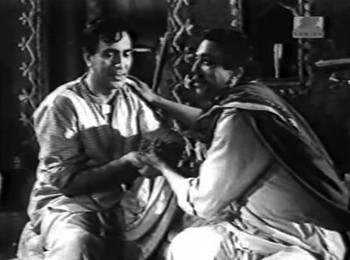
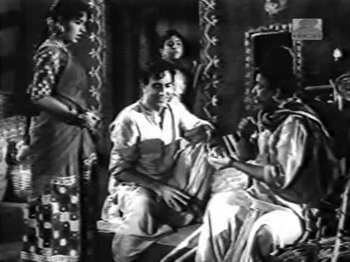
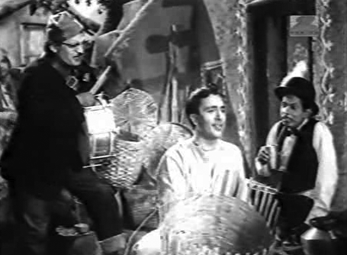
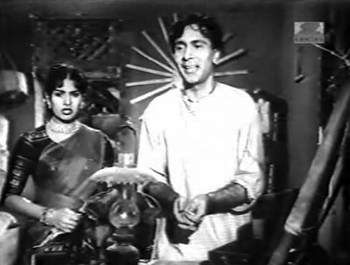

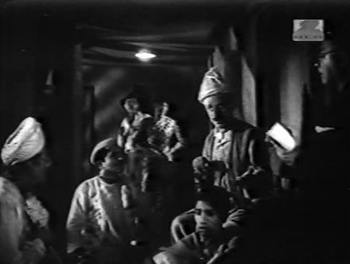

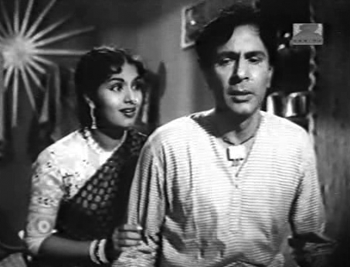

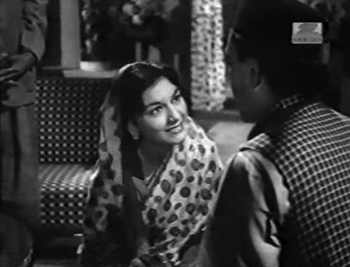

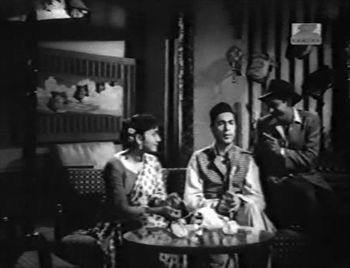
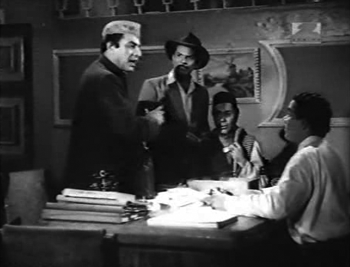
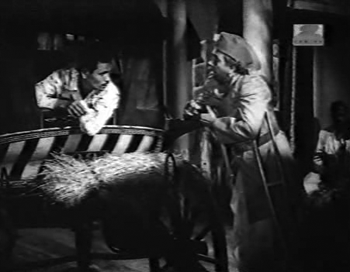
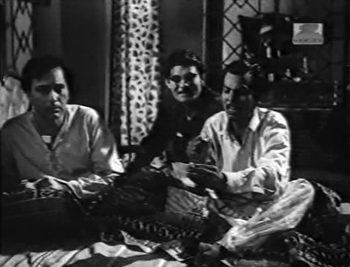
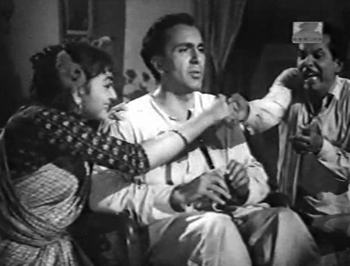
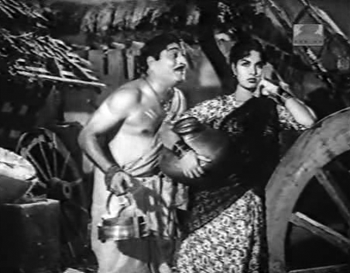
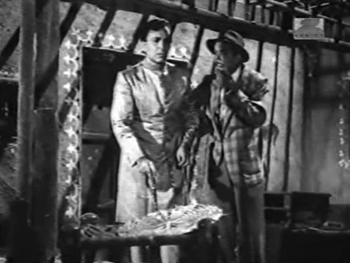
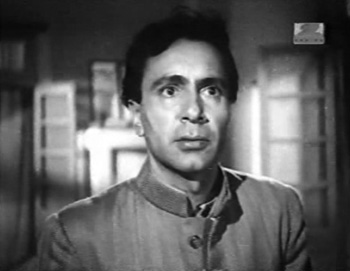
Another “Badruddin as baddie” (kinda) film – I want to see it for this reason also!
LikeLike
That’s an equally good reason to watch this film. I haven’t seen Johnny Walker in as negative a role in any other film, and he does full justice to it. Really good.
LikeLike
A bit far-fetched story, isn’t it? But we are in the realm of Hindi films so nit picking!
Shyama looks very beautiful here. In fact, more than usual!
Balraj Sahni looks wonderful!
From the face of it, the screen space seems to be fairly divided among its lead actors.
Happy Birthday Balraj Sahni!
LikeLike
Heh. Far-fetched, yes. But then when has that ever stopped cinema? (And not just Hindi cinema, but also cinema from other regions and countries) :-)
Yes, I agree that the screen space is fairly well divided amongst the lead actors. It’s not cluttered with lots of actors, and the story line is fairly simple – of course, with its fair share of coincidences – and entertaining.
LikeLike
Balraj Sahni was indeed a gifted man with many talents.He had written the screenplay of Baazi which was directed by Guru Dutt.He was highly educated and politically active too. I particularly like his films such as Naya Raasta,Izzat,Pehchan,Seema……the list is quite long.His portrayal of downtrodden common-man was quite realistic as in Do Bigha Zameen.He did play a negative role in Izzat.Although he played the “suffering” type quite often.It is quite sad he died so early.
LikeLike
From what I recall, he not just wrote the screenplay of Baazi, but was actually also the man who ‘discovered’ Johnny Walker, entertaining passengers in the bus on which he worked as a conductor.
Of the films you’ve listed, I don’t recall watching Pehchaan. Is Naya Raasta the Asha Parekh-Jeetendra one?
LikeLike
Yes,Naya Raasta starred Jeetendra and Asha Parekh and it had ” Maine Pee Sharab” filmed on Balraj.Pehchaan had Babita and Manoj kumar in the main lead.
LikeLike
Okay, thanks. It’s been years since I watched Naya Raasta, so I’ve forgotten all about it. Must see it again.
LikeLike
:)
LikeLike
Happy Birthday Balraj ji.
He was such an unlikely hero as you’ve put it so aptly DO. That alone makes him unique.
The story line is different as was the case in most films of the 50s – and they worked!!!!
Never knew Shyama and he acted together though I had heard of ‘mai baap’. The name is very noticeable.
He had a lovely voice too. Very cultured which when applied to the villager he played, turned humble, and gentle, and therefore pitiable.
I’ve seen a film with Johny Walker as a villaim. but can’t remember the name :-/
I like the comparison with Jane Bennet, but like Elizabeth (in reverse) he readily believed in the goodness of the ‘bad’ people.
Thanks DO. I’d like to see this film :-)
LikeLike
>Very cultured which when applied to the villager he played, turned humble, and gentle, and therefore pitiable.
This can be understood as though being humble and gentle is pitiable. What I meant was, the tone coupled with the sufferings and the bad situation he was in brought out the emotion of pity for him.
Foe me Balraj Sahni is the man walking down the fields in Do beegha zammen with Manna Dey singing dharti kahe pukar ke
Incidentally it’s also Manna Dey’s birthday today :-)
LikeLike
Thanks for reminding!What a coincidence that he lent his voice to Balraj for Kabuliwala,Ek Phool Do Mali, Waqt and Seema…………………………..
LikeLike
In Kabuliwala, too? Which song? I remember the Manna Dey songs Balraj Sahni lip-synced to in Waqt, Seema and Ek Phool Do Maali, but I don’t recall one in Kabuliwala…
LikeLike
Yes,Manna Dey gave playback for Balraj in this famous song-“Aei Mere Pyaare Watan” in Kabuliwaala
LikeLike
Not really. The man lip-syncing to the song isn’t Balraj Sahni. ;-) Balraj Sahni is one of the others sitting in the room. This song should probably be slotted along with Dharti kahe pukaar ke – with Manna Dey singing and Balraj Sahni in the frame, even though he isn’t lip-syncing to Manna Dey’s singing.
LikeLike
Sorry,you were right………I was confused by the same “beard” and I thought that it was Balraj Sahni :p
LikeLike
LOL. All that facial hair does get a bit much. ;-)
LikeLike
:)
LikeLike
“Foe me Balraj Sahni is the man walking down the fields in Do beegha zammen with Manna Dey singing dharti kahe pukar ke”
I’ve just been listening to that song. It’s so beautiful, and that image of Balraj Sahni – as the man who is crushed by his poverty, but who still has enough of a heart to show kindness and affection to the two little girls whom he takes to school in his rickshaw every day… that is quintessential Balraj Sahni. An air of so much dignity and quiet humanity.
LikeLike
I had seen ‘Do Beegha Jameen’ when I was in primary school and the movie was shown on DD. Although I did not understand the dialogues at that time (as Hindi is not my mother tongue), just by watching Balraj Sahni’s effortless and superb acting, I understood the emotions and cried buckets. That movie was SUPERB! Since then Mr. Sahni has been one of my favourite actors and it felt so nice to read a tribute to him and the subsequent comments on his 100th Birthday. Thanks Madhu and all the other bloggers. :-)
LikeLike
Thanks, Anjali! Yes, Do Bigha Zameen is an amazing film, and his acting in that gives me gooseflesh – he is Shambhu. And to think that most people were very sceptical about Balraj Sahni being able to pull off the role of a poverty-stricken villager, since they’d always perceived him only as a fairly Westernised man, the suit-clad, urbanised and wealthy gentleman.
LikeLike
You’ve put it so well, pacifist. Balraj Sahni was really a very unlikely hero. I remember, the first film of his that I saw in which he wasn’t the benevolent old man, was Seema. I was quite young (maybe in my early teens) and kept waiting for the real hero to turn up! I remember being rather disappointed that Nutan’s character ended up with him. ;-) Thankfully, I’ve grown up now and can appreciate the charm of a Balraj Sahni.
“I like the comparison with Jane Bennet, but like Elizabeth (in reverse) he readily believed in the goodness of the ‘bad’ people.”
Not quite sure what you mean here… I was remembering that scene in Pride and Prejudice when Lizzie and Jane are talking, and Jane tries to keep making excuses for Mr Darcy and Wickham, refusing to believe that either of them could be in the wrong. There’s that comment from Lizzie about there being just enough goodness for one man (or something along those lines). Jane’s insistence that there must be some misunderstanding, and that nobody can be that bad, made me think of her when I was watching this.
LikeLike
Yes, that fits very well. I was bringing in the eagerness with which Eliza believed and trusted Wickham, just as Balraj Sahni’s character here easily believes Johny Walker’s character to be good and trusting.
I guess my phrase *in the reverse* was unnecessary and confusing.
I had another thing in mind and wrote something different. :-/
LikeLike
Yes, of course. Eliza’s swift and completely gullible trusting of Wickham does have the same air of being totally taken in, as Chandan’s. Good point, and I see what you mean.
LikeLike
PPS: very nice header. Who’s the man running?
LikeLike
Thank you! I thought nobody had noticed the new header. The running man is Gregory Peck – that shot is from Salvador Dali’s dream sequence in Spell Bound.
LikeLike
Thanks DO. Dream man running in dream (sequence) :-)
LikeLike
I did notice the new header! In fact, I was just thinking when I clicked on it this morning that I hadn’t commented on it. Verrry sophisticated. :) No, truly – it’s very classy, all the black and white and grey tones, with just that accent of pink; ’tis very eyecatching.
LikeLike
And the black on the left slowly changing to lighter shades till it’s almost white to the right.
Very auteuristic :-)
LikeLike
All the result of pure experiment! Thank you. :-)
LikeLike
Now I’m getting all embarrassed (but idiotically pleased, too), Anu. :-D Thank you, thank you.
LikeLike
:-D Absolutely!
LikeLike
I haven’t seen this film, though I have heard of it, of course. Thanks for a lovely review of one of my favourite actors, Madhu. Or perhaps, I should say ‘non-actors’ because Balraj Sahni never looked like he was acting! He just was the character. And Balrah Sahni with Shyama…. and Johnny Walker. That casting itself merits a watch. I assume the film ends happily for Chander and Basanti? (I’m not watching, if not. I’m not in the mood for any more sadness. :( )
LikeLike
Very true. Balraj Sahni never seemed to be acting. He fitted so perfectly and seemingly effortlessly into every role he played!
No, the film does not end sadly. Quite the contrary. And, another reason to watch it: Shyama’s character shows a good bit of spine later in the film. Plus, Johnny Walker is really good too.
LikeLike
Even in Black Cat, he manages not to act like a typical hero. He is just a police officer, who happens to have a pretty girlfriend with a shady brother.
I had no idea about this film. Thanks for reviewing it.
Yes, the seedha saada act can get on one’s nerves. I hope the movie ends well. :)
LikeLike
I agree, even in Black Cat (it’s been a while since I saw it), he wasn’t the sort of cop that an Ajit or a Dev Anand would have been. He’s – well, Balraj Sahni. :-)
The movie ends very well. Do look out for it; it’s certainly worth watching.
LikeLike
:) Will do.
LikeLike
Hi,
Balraj Sahni is one of the best natural actor. His last movie is a classic,
`Garam Hawa’ . Worth a watch.
Thank you
LikeLike
I hate to admit this, but I don’t remember watching Garam Hawa. (I know, I know… ). That is, of course, one of his greatest roles. Must amend that soon and get hold of the film.
LikeLike
It seems that in this film Balraj Sahni was often called upon to play the male version of the “self-sacrificing female sati savitri” that is so irritating. Sign of a brilliant actor that it didn’t jar as much.
LikeLike
Yes, it didn’t jar too much, not only because Balraj Sahni was such a fine actor, but also because one can see how he could have been duped. It still doesn’t account for his complete naïveté, but still… and, actually, the latter half of the film does compensate.
One film where Balraj Sahni plays the male Sati-Savitri and really got on my nerves was Bhabhi. Terrible film, that one. God knows what he (and Shyama, who was also in the film) were thinking when they signed it. It was just not worth either of them.
LikeLike
I enjoyed this film very much, got to know about it on this blog itself (Johnny Walker’s 10 best roles I think was the post).
Agree with everything that has been said about Balraj Sahni.
Have you seen ‘Sunghursh’ 1968 ? Interesting film and cast.It starred him with Dilip Kumar and Sanjeev kumar. The second half of that film was kind of a love triangle between him, Dilip Saab and Vyjayantimala. Sanjeev Kumar might have been his ‘successor’ , very similar and very good actors.
and there was ‘Duniya’ 1968 with Dev Anand , a decent thriller, surprisingly lesser known.
Wasn’t there one film with Shammi Kapoor as well, ‘Jawan Mohabbat’ probably?
LikeLike
Johnny Walker played a villain before this film also in ‘Railway Platform’ 1955, Sunil Dutt’s debut film. Check the parody of ‘Dekh tere sansar ki haalat kya ho gayi bhagwaan’ in that, both lip synch that song.
LikeLike
Oh, yes. I’ve heard that song, though I’ve not seen the film yet. It’s been on my to-watch list ever since I read bollyviewer’s review of it. Must look for it; I think it’s on Youtube.
LikeLike
Madhooo… I posted the original and the parody in my post on cynical songs…
Now I’m heart broken…
LikeLike
“Now I’m heart broken…”
Anooo, why, exactly? From what I can see of my comment, I’ve simply said I hadn’t seen the film. Okay, I know I slipped up in not mentioning that you had recently included the song in your post, but come on… surely I’m allowed the occasional faux pas! I am familiar with the song, by the way, which is why I’ve said that I’d heard it.
Now my heart is broken…
LikeLike
For Anu and Madhu ;-)
LikeLike
LOL! Good one, pacifist. :-D
LikeLike
I’ve had my heart broken a couple of times, but not because you didn’t remember I had listed that song!
C’mon Madhu, I can’t pull your leg now? (I think my heart is truly broken now!)
Pacifist, you wicked, wicked woman! How can I have a broken heart when you make me laugh so much?!! Jab di hi toot gaya indeed!
LikeLike
I was actually also going to post a link to Is dil ke tukde hazaar hue, then figured that would be a bit much! ;-)
LikeLike
I just listened to this after a long time and to wander-off from the point, what fabulous lyrics this song has.
LikeLike
No, I haven’t seen Sangharsh. I’m not keen on Dilip Kumar’s films in the latter half of the 60s – but if you’re recommending it, I’ll look out for it. And I do like Sanjeev Kumar a lot. He’s one of my favourite actors. I agree about him being similar to Balraj Sahni in some ways – very versatile, and a superb actor. Though I think he had a greater falir for comedy than I’ve seen in Balraj Sahni…
Yes, I’ve seen Duniya. Pretty entertaining film, though it’s been a while since I watched it. Good songs, too! It’s been years (actually, decades) since I watched Jawaan Mohabbat, so I’d forgotten that Balraj Sahni appeared in that too. But I’ve just been reading up his filmography, and you’re right – he is in that.
LikeLike
I’ve seen “Mai Baap” but darn if I remembered anything about it! Your detailed and comprehensive review is much appreciated, Madhu.
While I share everyone’s opinion on Balraj Sahni acting prowess, I also thought he was rather handsome man who aged very gracefully. Indeed given his looks, he could have been the conventional hindi film hero, but luckily for us he chose to be someone more interesting.
PS.
LikeLike
Yes, he was really rather dishy, wasn’t he? Have you seen this early photo of his (he must’ve been about 23 years old here, since it’s from 1936), and even that young, he has a dignity and elegance about him that one doesn’t usually see in men that age.
LikeLike
What a lovely picture! He so handsome and she so beautiful!
Thanks DO.
LikeLike
Aren’t they? And, because they look so wonderful together, I decided I might as well embed the photo here too (more so, since it’s in the public domain) :-)
By the way, I have a feeling that I’ve seen Balraj Sahni’s character in some film, acting the husband of a woman named Damayanti. Can’t recall which.
LikeLike
Wikipedia says he acted in a film gudiya with his wife Damyanti as his heroine. The same year she died.
LikeLike
Yes, I read that too. What I meant was that I seem to recall him acting as the husband of a character named Damayanti in some film. Though maybe I’m mistaken.
LikeLike
Perhaps it’s the similar sounding Lajwanti? Which doesn’t mean he didn’t act in a film where the heroine was named Damayanti :-)
LikeLike
Maybe! I just have this niggling feeling that it was Damayanti. Someday, perhaps, years from now I will find the film, and it’ll be a “Eureka!!” moment. If a film like that exists, anyway! :-D
LikeLike
As usual I am late, this time it was my health once again creating a bit of a problem and I am also involved in some activity. I don’t need to say I love your new heade,r after all it is from my fav film Spell Bound.
I was surprised to see that it was Balraj Sahni’s 100th birth anniversary. Gosh how time flies. I realized that 40years had passed since his demise and he was 60years then. My father passed away in 1972 and he passed away the following year. I remember my mum was very upset, I was rushing off to school when she happened to glance at the paper and saw the sad news. I guess you will forgive me as I am going off the point, after all your post is about Mai Baap, but I just cannot help get emotional about Balraj Sahni. You see my father was among those very fortunate to get a wonderful send off from the film industry. Literally the ‘ who’s who’ of the industry turned up at his funeral but one person was missing and that was Balraj Sahni. He was the last person we were expecting to see, we knew he had lost his daughter under very tragic circumstances on March 6th, she had committed suicide. Incidentally, in his last film Garam Hawa he portrayed the role of a father whose daughter commits suicide. Everybody knew that he loved his daughter very much as all father’s do, so it was quite a blow. When my father heard the news he told mum, “I must go and meet Balrajji, tomorrow is Shilpi’s birthday, I will go day after tomorrow”. However he himself left the world on that day. Two days later two gentlemen came over to our home and delivered a letter handwritten by Balrajji. It was a beautifully worded letter addressed to my mother. He regretfully expressed his inability to come over personally considering his own tragic loss. This was what overwhelmed my mum. Mum said he needn’t have bothered, we all know what he is going through.
Another interesting thing that I learnt about him from Talat Uncle (Talat Mahmood) was Balraj Sahni’s concern for the film workers. I have forgotten the details but from what I remember, during the shooting of Sone Ki Chidiya the workers had some problems, Balraj Sahni went round giving them money. He was indeed a wonderful man.
As far his acting is concerned I loved him best in Waqt.- Shilpi
LikeLike
Shilpi, I don’t mind you going completely off the point, if this is how you do it. Those anecdotes are so very touching, and beautiful. Balraj Sahni seems to have been a wonderful person, not just a great actor. I hadn’t known that his daughter had committed suicide. How tragic – it must have been terrible for him.
Incidentally, talking about fathers’ love for their daughters, there’s a very sweet story about the song Baabul ki duaaein leti jaa (coincidentally, also picturised on Balraj Sahni).
I’m sure you must have heard of this one. People were very impressed with the poignant and emotional way in which Rafi had sung this song, and asked him how he managed to do that. He replied that, just the day before he recorded the song, he himself had seen off his newly-married daughter, so he thought of her bidaai and how it had affected him – and that love poured forth in the song.
LikeLike
Yes I know this one,I had read it too.
LikeLike
I would place Anuradha, Kabuliwala and Garm Hawa as not only his, but few of the best enacted films.
LikeLike
True. I haven’t seen Garam Hawa yet, but Kabuliwaala is one of the best acted films I’ve seen. As far as Anuradha is concerned, the one complaint I have as far as the acting goes, is that Leela Naidu’s diction is not quite right. Her acting, otherwise, is good – as, of course, is Balraj Sahni’s, and the others’, even the little girl’s.
LikeLike
The common element among these three acting performances of Balaraj Sahni is the his underplay, which brings out the travails of the each of the character so vividly, without distracting the main story line of the film.
It is said that he suffered his fatal strike after he had shot the last scene of Garm Hawa where he keeps seeing, through a blank stare, the blood flowing out of her daughter’s hand.
LikeLike
I agree with you. Balraj Sahni’s acting is invariably very understated and restrained – he manages to get the message across without resorting to high drama.
Your description of the scene from Garam Hawa (which I’ve been long intending to see, anyway) makes me want to get hold of the film as soon as possible.
LikeLike
I look forward to reading the review on this blog.
LikeLike
I doubt if that will happen – I don’t review films beyond about 1971, and even then, the only post-60s films I review are the ones that feel from an earlier period, like Sharmeelee. But I shall certainly let you know how I felt about it, whenever I do get around to watching it.
LikeLike
I can give you a clue to bend your self-imposed boundary – Garm Hawa is about the poignant partition of families during The Partition.
I am quite sure the digress from the ‘scope’ will be well its worth.
LikeLike